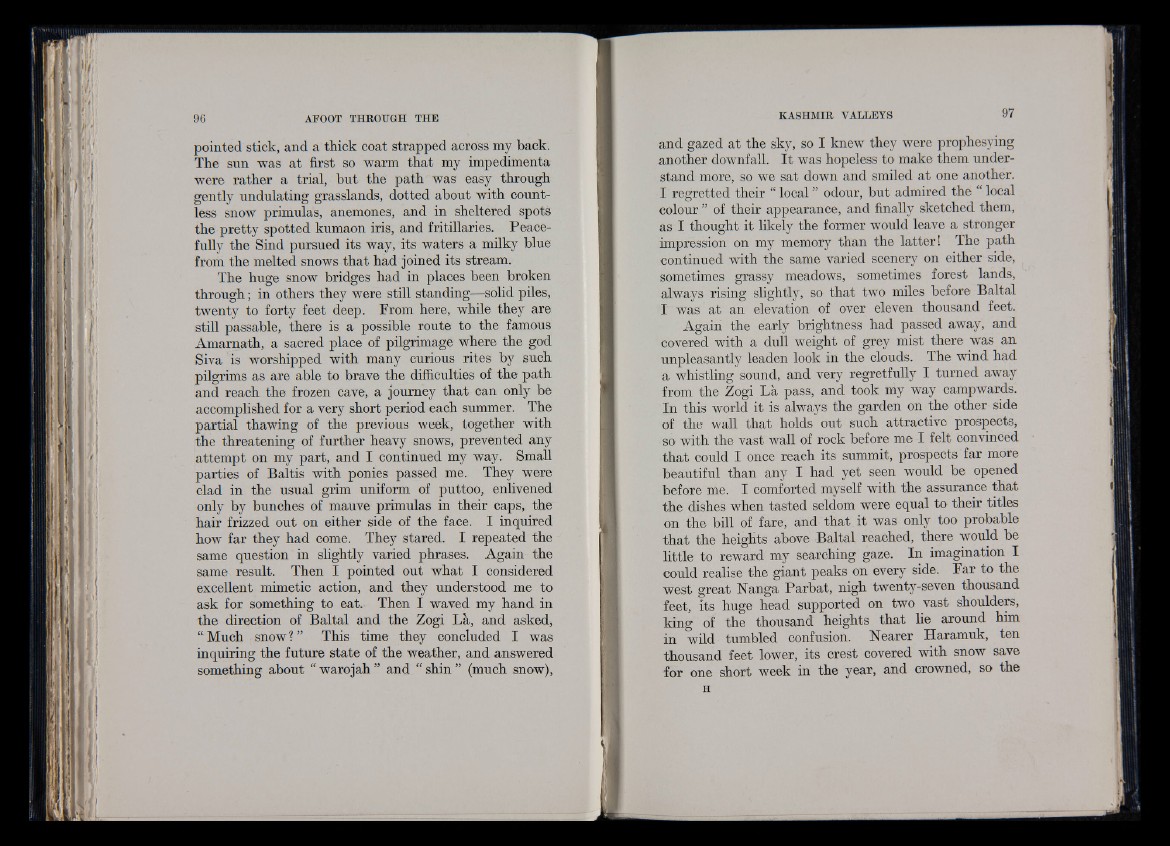
pointed stick, and a thick coat strapped across my back.
The sun was at first so warm that my impedimenta
were rather a trial, but the path was easy through
gently undulating grasslands, dotted about with countless
snow primulas, anemones, and in sheltered spots
the pretty spotted kumaon iris, and fritillaries. Peacefully
the Sind pursued its way, its waters a milky blue
from the melted snows that had joined its stream.
The huge snow bridges had in places been broken
through; in others they were still standing—solid piles,
twenty to forty feet deep. From here, while they are
still passable, there is a possible route to the famous
Amfl.ma.-th, a sacred place of pilgrimage where the god
Siva is worshipped with many curious rites by such
pilgrims as are able to brave the difficulties of the path
and reach the frozen cave, a journey that can only be
accomplished for a very short period each summer. The
partial thawing of the previous week, together with
the threatening of further heavy snows, prevented any
attempt on my part, and I continued my way. Small
parties of Baltis with ponies passed me. They were
clad in the usual grim uniform of puttoo, enlivened
only by bunches of mauve primulas in their caps, the
hair frizzed out on either side of the face. I inquired
how far they had come. They stared. I repeated the
same question in slightly varied phrases. Again the
same result. Then I pointed out what I considered
excellent mimetic action, and they understood me to
ask for something to eat. Then I waved my hand in
the direction of Baltal and the Zogi La, and asked,
“Much snow'?” This time they concluded I was
inquiring the future state of the weather, and answered
something about “ warojah ” and “ shin ” (much snow),
and gazed at the sky, so I knew they were prophesying
another downfall. I t was hopeless to make them understand
more, so we sat down and smiled at one another.
I regretted their jg local ” odour, but admired the “ local
colour ” of their appearance, and finally sketched them,
as I thought it likely the former would leave a stronger
impression on my memory than the latter! The path
continued with the same varied scenery on either side,
sometimes grassy meadows, sometimes forest lands,
always rising slightly, so that two miles before Baltal
I was at an elevation of over eleven thousand feet.
Again the early brightness had passed away, and
covered with a dull weight of grey mist there was an
unpleasantly leaden look in the clouds. The wind had
a whistling sound, and very regretfully I turned away
from the Zogi La pass, and took my way campwards.
In this world it is always the garden on the other side
of the wall that holds out such attractive prospects,
so with the vast wall of rock before me I felt convinced
that could I once reach its summit, prospects far more
beautiful than any I had yet seen would be opened
before me. I comforted myself with the assurance that
the dishes when tasted seldom were equal to their titles
on the bill of fare, and that it was only too probable
th at the heights above Baltal reached, there would be
little to reward my searching gaze. In imagination I
could realise the giant peaks on every side. Far to the
west great Nanga Parbat, nigh twenty-seven thousand
feet, its huge head supported on two vast shoulders,
king of the thousand heights that lie around him
in wild tumbled confusion. Nearer Haramuk, ten
thousand feet lower, its crest covered with snow save
for one short week in the year, and crowned, so the
H